Bangladesh
Brief history
1947: Partition of British India into India, West Pakistan and East Pakistan
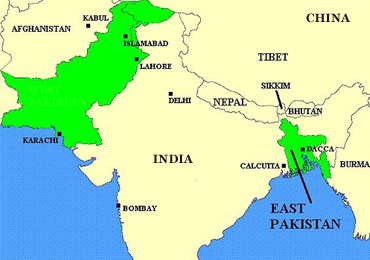
On 14 August 1947, the British Raj's rule in India came to an end after 89 years of colonial rule (from 1858 to 1947). The partition of British India into secular India and Islamic Pakistan was mainly on communal ground with the vast majority of Muslims split into West and East Pakistan to the either side of mainland India.
East Pakistan, originally termed East Bengal (after splitting from Kolkata and 'West Bengal' briefly between 1905 and 1911 - referred to as Bongobangha), was three times as small as West Pakistan in geographical size but roughly twice the population - East Pakistan had 44 million whilst West Pakistan had 25 million people.
Political power and economic benefits were mainly concentrated in West Pakistan and it was widely perceived that East Pakistan was being exploited economically as it was a haven for agriculture.
These growing tensions would later result in the split of East Pakistan into an independent country - BANGLADESH.
1952: Bhasha Andolon & Ekushey February
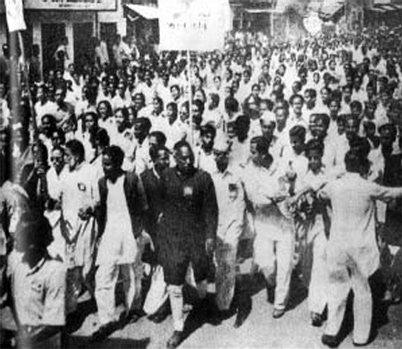
In 1947, efforts were underway to introduce a state language of newly formed Pakistan. A national education summit in Karachi advocated Urdu - then spoken by 3% of the population - as the only state language. Bangla (spoken by the 56% of the country) and Punjabi (28%), the majority language of east and west Pakistan respectively, were both overlooked.
Bangla was removed from the list of approved subjects as well as from currency notes and stamps and recruitment tests for the navy. This lead to protest by students from Dhaka University.
In the height of unrest, Pakistan's first Governor-General, Mohammad Ali Jinnah, declared "Urdu and no other language" would be the common language for all Pakistan citing the language problem was designed by 'fifth column' (i.e. internal mischief makers) to divide Pakistani Muslims. His views were supported by Khwaja Nazimuddin, a Bengali, when he became Prime Minister of Pakistan.
The language controversy eventually reached a boiling point where East Pakistan revolted while the other part of Pakistan remained calm. Several students and civilians lost their lives in a police crackdown on 21 (Ekushey) February 1952 at the University of Dhaka. They became the first people in the world to give their life for their mother tongue.
Ekushey February is revered as the 'Shaheed Dibosh' (Language Martyrs' Day), and the Shaheed Minar was built to remember those killed. In 1999 UNESCO declared 21st February as 'International Mother Language Day' in memory of the 1952 Bangladesh killings for the whole world to celebrate the importance of language.
Read more about Bangladesh Language Movement (1947 - 1952)
1970: Bhola Cyclone
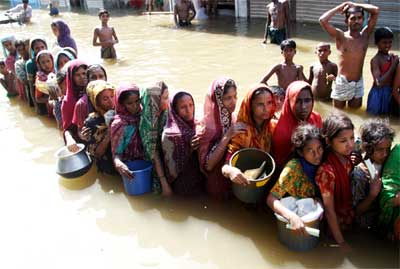
On 12 November 1970, tens days into the fasting month of Ramadhan, the south coast of Bangladesh (then East Pakistan) was flooded by one of the deadliest tropical storm on record and hit with wind travelling at 115mph (185km/h).
The most affected region was Barisal where over 45% of it's population was killed. It is estimated over half a million people died.
The first concert in world history was held to raise awareness of this human tragedy. It was held by Indian sitar maestro Ravi Shankar and British ex-Beatle George Harrison.
The lack of relief effort of President Yahya Khan would further increase the conflict between the two wings of Pakistan and would lead to the Bangladesh Liberation War four months later.
This is one of the first times that a natural event helped to trigger a civil war.
Read more about Bhola Cyclone (1970)
1971: Muktijuddho / Swadhinata Juddho / Sangram
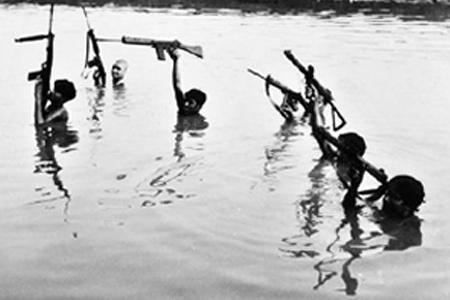
After 23 years of economic, social and political grievances, tensions erupted in the eastern wing of Pakistan especially after they were denied their democratic electoral victory in 1970.
War broke out on the midnight of 25 March 1971 after the Pakistan Army, backed by Muhajir-dominated power elite of West Pakistan, attacked students, civilians and officers in Dhaka in a military operation termed 'Operation Searchlight'.
This lead to nine months civil war between the mighty Pakistan Army and its Bengali collaborators, the Razakars, versus the guerrilla warfare of Mukti Bahini (Liberation Army) and Muktijuddhas (Freedom Fighters), made up of Bengali military, paramilitary, and civilians.
Sea of refugees (estimated to be about 10 million) flooded into eastern province of India and an estimated 3 million Bengalis were killed (including over 1,000 intellectuals) and over 200,000 women and girls were raped - though the exact number are contestable - in one of the worst atrocity of the 20th century.
India provided economic, military and diplomatic support to Mukti Bahini and officially entered the war on 3 December 1971 after Pakistan attacked it's western border. Victory was achieved 13 days later, on 16 December 1971, after the Mitro Bahini (allied forces of Indian army and Mukti Bahini) defeated the West Pakistani forces deployed in the East.
In Bangladesh, 26th March is revered as 'Swadhinata Dibosh' (Independence Day) whilst 16th December is celebrated as 'Bijoy Dibosh' (Victory Day). The Jatiyo Smriti Shoudho, the Rayer Bazar, and Muktijuddho Jadughar are few of the monument and organisation set up to remember this momentous event and sacrifice.
Read more about Bangladesh Liberation War (1971)
1974: Bangladesh famine
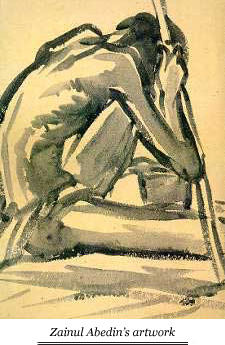
From April to July 1974, Bangladesh was hit by heavy rainfall and a series of devastating floods along the Brahmaputra river causing devastation to crops and killing thousands of people in the process.
Rice crops were devastated and prices rocketed. The poor, labourers and non-landowners were the most vulnerable. Widespread starvation was reported in the Rangpur district, south of Bangladesh - one of the worst affected areas. And this, along with the devastation caused to the country, infrastructure and economy during the Muktijuddho two and half years ago meant Bangladesh was not prepared to deal with the situation.
Neighbouring India too had declined to cooperate with the government of Bangladesh and the USA had withheld 2.2 million tonnes of food aid to 'ensure that it abandoned plans to try Pakistani war criminals' and prevent Bangladesh from exporting jute to Cuba - their local enemy. When Bangladesh did cooperate with the USA by stopping jute export to Cuba it was too late for the famine victims. The damage was done.
An estimated 1.5 million people died.
This Bangladesh famine of 1974 is considered one of the worst in world history. It is only eclipsed by the Bengal famine of 1943 where over 3 million people died, and in 1770 where over 10 million were killed.
Inna-lillahi-wa inna illahi rajiun.
1975 - 81: Assassination of Bangabandhu & Shaheed Zia
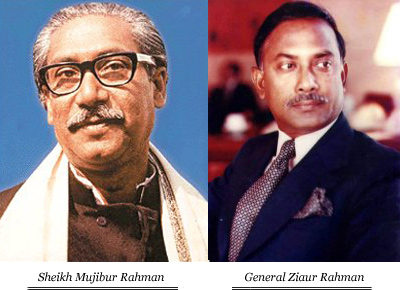
Sheikh Mujibur Rahman, fondly referred to as Bangabandhu (Friend of Bengal), was a founding member and later the leader of Awami League who became the first President of Bangladesh in 1971. He was also the first to change the name of the country from 'East Pakistan' to 'Bangladesh'.
However, post independence and in the face of continuing economic hardship and mounting public disorder, Sheikh Mujib introduced the 'one-party system' in 1974 (thereby preventing other parties from election).
On 15 August 1975, Sheikh Mujib and 20 members his family and associate were assassinated by young, rebel army officers in Dhaka. Only his two daughters who were away in West Germany survived. The elder daughter, Sheikh Hasina Wazed, would later become the Prime Minister of Bangladesh.
Following Sheikh Mujib's assassination army chief General Ziaur Rahman, fondly referred to as Shaheed Zia (Martyred Zia), took over after a short period of coup and counter coup which included murder of four founding members of the Mujibnagar Shorkar, the first government of Bangladesh who led the Bengalis during Muktijuddho.
Ziaur Rahman, who during the 1971 Muktijuddho aged 35-years old declared Independence of Bangladesh on behalf of Sheikh Mujibur Rahman, founded the Bangladesh Nationalist Party (BNP) and later became 7th president of Bangladesh in 1977.
On 30 May 1981, General Zia, his six bodyguards and two aides were assassinated in Chotrogram whilst staying in Chittagong Circuit House by dissident group of the army. The conspirators were either taken into custody or killed. General Zia's wife Khaleda Zia later become the first female Prime Minister of Bangladesh.
Both Sheikh Mujib's Awami League and Ziaur Rahman's BNP dominate the political scene of Bangladesh.
Read more about Sheikh Mujibur assassination (1975)
Read more about Ziaur Rahman assassination (1981)
2011: Cricket World Cup held in Bangladesh
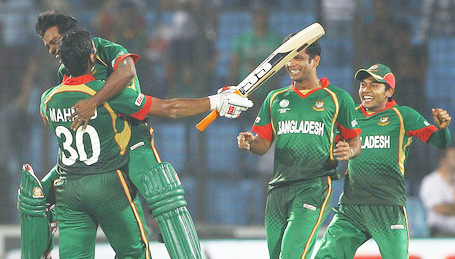
The 10th Cricket World Cup was held in Bangladesh in partnership with India and Sri Lanka.
The opening ceremony was held in Bangabandhu Stadium, Dhaka and viewed by a global audience of over 1 billion. The opening match was played between Bangladesh and India with India - who would go on to win the world cup - only beating Bangladesh by 87 runs (Bangladesh scored 283 in reply to India's 370).
Bangladesh narrowly missed out on the quarter finals too due mainly to a woeful performance against West Indies. However, Bangladesh continued their giant killing instinct by beating England in the group stages in a thrilling encounter in Chittagong - with only 6 balls left to achieve their target score.
They had previously beat India by 5 wickets in 2007 (West Indies) and Pakistan by 62 runs in 1999 (England).
The 2011 tournament was only Bangladesh's fourth appearance in the World Cup since gaining test status in 2000 and the first time in the short but turbulent history of Bangladesh that such a major spectacle was held.
Read more about 10th Cricket World Cup (2011)
Discover more...
Read full history of Bangladesh.
For latest Bangladesh news and information go to Bangladesh's official website or visit BBC's Bangladesh news page.
